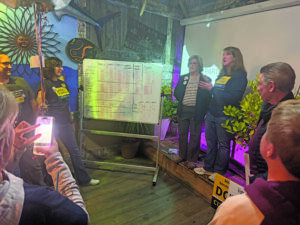 Phil Neri is trying to get the cat to jump into his arms. “Come on, sweetie, come on, oh come on.” The cat is a white and black, short haired and feral, meaning it was born and grew up outside of human contact. The cat is staying a consistent ten feet away, watching to see when Neri will put down a box of food.
Phil Neri is trying to get the cat to jump into his arms. “Come on, sweetie, come on, oh come on.” The cat is a white and black, short haired and feral, meaning it was born and grew up outside of human contact. The cat is staying a consistent ten feet away, watching to see when Neri will put down a box of food.
“He won’t come because you’re here,” Neri says to me, turning his short stocky frame toward me with an apologetic, disappointed and always matter of fact look on his face. He’s layered warmly, which is good because it’s a cold night. The wind picks up occasionally, making the temperature unbearable for me for few seconds before dying back down. Neri, however, doesn’t seem to mind.
He is often out feeding feral cats no matter what the temperature is. “Usually this one will jump right to me. They don’t like new people. Don’t take it personally.”
I assure him that I won’t, but I get the feeling he was reassuring himself as much as me.
We’re in an alley behind an Arlington shopping center and it’s a little after 11 at night. This is one of the 13 feeding areas for the five feral cat colonies that Neri considers himself responsible for.
When I asked him if he’s ever felt or been threatened when he cares for the cats he tells me, “Well, I’ve been knifed twice.” He sees the worried expression on my face and explains, “It’s less bad in the winter because everyone’s inside. In the summer, though, it’s bad, lots of harassment.”
 This eases my mind, a little. A police car drives by and pays us no mind. “The police never bother me. That wasn’t a very observant officer though, he should have kept his eye on me, but he didn’t even notice me.”
This eases my mind, a little. A police car drives by and pays us no mind. “The police never bother me. That wasn’t a very observant officer though, he should have kept his eye on me, but he didn’t even notice me.”
When we first pulled into the alley, I immediately noticed two pairs of feline eyes in the trees on one side of the alley reflecting the headlights of Neri’s truck. The eyes belonged to the aforementioned black and white short hair as well as a downtrodden-looking white longhair.
As Neri pulled in and parked next to a dumpster, they didn’t run away like ferals usually do at the first sign of a person.
At least three nights a week Neri ventures out under cover of darkness to leave food in five of his feeding areas, scattered around alleys and apartment buildings in Arlington. He also makes efforts to trap as many feral cats as he can so they can be neutered for population control. The newly neutered cats are then released back into their territories.
Neri has been doing this for more than five years now. He spends $90 of his own money a week on cat food alone. “I could have been a biker, or bought a house with all the money I’ve spent.” He says this sardonically, without a hint of regret.
At the coffee shop where he always begins his rounds, he tells me how he got started. Twenty two years ago he began feeding feral cats living outside his apartment in St. Louis. He even built them a winter shelter.
Regretfully, this did more harm than good. “What I was doing was breeding the cats.” Colonies of feral cats form around supplies of food, and their population will always grow to the maximum the food supply will allow.
A six month old female cat can produce up to seven litters of kittens in one year. The overall feral cat population in the United States is impossible to estimate with any certainty.
The organization, Alley Cat Allies, places the total number of ferals at 22 million, with over two million living in the D.C. Metropolitan area alone. The average life span of a domestic cat is 12 to 15 years. The average life span of a feral cat that survives beyond kitten hood (most don’t) is about two years.
“You must think I’m some sort of monster,” Neri says, since he began by feeding cats, but not neutering them. He quickly adds, “There was no TNR idea back then.” (TNR is shorthand for the practice of trapping feral cats, neutering them, and releasing them, which is thought to be the most effective method of population control. It is more effective than hunting and killing the ferals, because more cats will simply breed to take their place. But if a cat is neutered, it will still eat the food. This leaves no “space” for more to breed, and it can not breed more itself.
When Neri moved to Arlington in 1986 he sent money to the young couple that occupied his old apartment in St. Louis to continue feeding the cats. “What a mess I made,” he says sadly. He continued sending the couple money for six months before the husband got a job in Chicago and they moved.
“The poor babies had to fend for themselves after that.” When he moved here, he repeated his mistake by feeding cats around a library in Rosslyn were he studied. When heavy commercial development forced the cats out, he stopped.
A year later he purchased a car, and almost immediately became an independent trapper. When anyone called an animal shelter about a stray, the shelter would often refer the caller to Neri. He would trap the cat using a metal cage baited with food, then take it to be neutered and released.
He continued this until a woman called him and told him about a feral cat colony living outside of her apartment in Arlington. He trapped and released as many in the colony as he could, and continued to leave food out for the colony “to give these animals
some quality of life.”
Through word of mouth and his own searching, he found four more colonies of feral cats living around Arlington.
On this night he takes me to five feeding areas, each representing a different colony.
The first lies next to a large creek in the woods behind a nondescript apartment building. When we pull in, I see a single cat walking towards us out of the trees. “They know the sound of my engine.” Neri explains.
After Neri parks the truck I watch the cat dart in and out of the shadows. The cat keeps a safe distance, while keeping us in view, obviously and always hungry. Most ferals will run away at any sign of a human, and strongly dislike being kept in captivity.
The window for socializing starts closing when a cat reaches six weeks of age, and closes when it reaches 16 weeks, when socialization becomes virtually impossible.
“Never approach a feral,” Neri tells me. “They will always run away, but if you corner one, you’re dead.”
I laugh, and then he laughs at me. “I’ve been in the hospital a total of 22 days due to cat bite fever.” The mouths of cats contain many types of bacteria which are dangerous to humans.
“Feral cats are not dangerous.” He then says with some urgency, “If you leave them alone they’ll leave you alone, every time I’ve been bitten it’s been my fault.”
Neri gets out of the truck and opens the back to show me what he refers to as his “weapons”, an entire arsenal of cat food, bottles of fresh water, at least five cage traps and a few cardboard boxes. He grabs a cardboard box and cuts two slits in opposite flaps, then sticks the corners of a perpendicular flap into them so it stays closed. He fills the box with food and walks a ways into the woods with it.
He sets it down so the closed flap is at the bottom. This creates a food source that is hard for squirrels and rodents to access, but is easy for the cats. After the food is gone, the box doubles as a semi enclosed shelter for one lucky cat, two if they’re close friends.
He repeats this process in an alley, two more apartment complexes and a desolate lot behind a Petco. At each site we visit, at least a few cats are immediately visible when we pull in, and they keep their distance, eyeing Neri and his food.
In the last apartment we visit, I see a few teenagers wandering around and hanging out next to their cars. Neri tells me that the new managers of this particular
complex decided that the ferals were a nuisance, and drove them away from the apartments, although they still return to eat Neri’s food.
The apartment never had a rodent problem before and the cats never bit anybody, but since they’ve been removed, there have been three complaints of rodent bites in the complex.
Feral cats are extremely good hunters, and police small rodent populations very effectively.
“I don’t know why I do this,” he tells me when I ask. “I just feel compelled.” The idea of a cat, alone, cold and hungry seems to strike a very visceral nerve in him. “The number one problem these animals face is ignorance,” he repeats at various points throughout the night. “Just feeding is breeding.”
I try to get him to give me more complete answer but “I just feel compelled” is the best I can get. Neri has spent an incredible amount of his time and money caring for what most people consider pests and a nuisance. He obviously enjoys it, but he also does it with the air of someone who doesn’t feel he has a choice.












